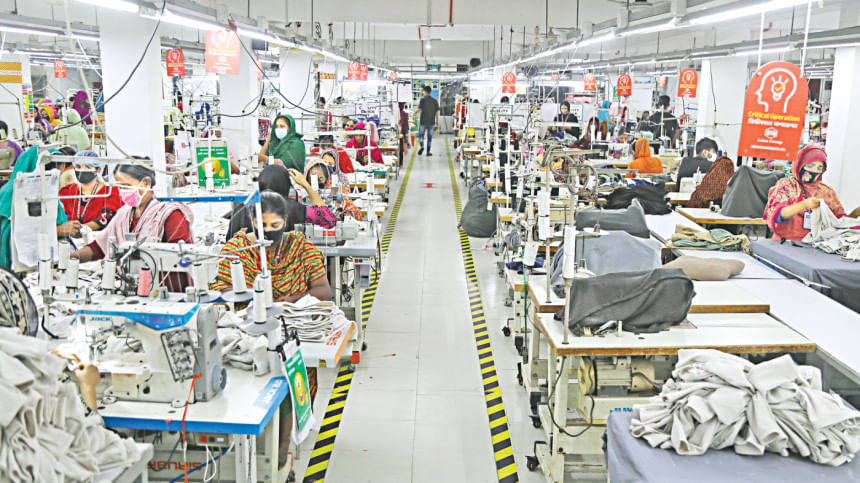Economy shows signs of recovery: MCCI

Bangladesh's economy is showing early signs of recovery, but weak private sector credit growth, falling investments, and reduced imports of capital machinery have slowed momentum, according to a new report by the Metropolitan Chamber of Commerce and Industry (MCCI).
"…several structural issues continue to weigh heavily on recovery," said the report, "Review of Economic Situation in Bangladesh April–June 2025 (Q4 of FY25)," published yesterday.
The chamber also cited longstanding problems in the banking sector, including regulatory gaps and widespread loan irregularities, as major obstacles to broader economic improvement.
Export earnings in FY25 rose about 9 percent year-on-year to $48.28 billion, driven mainly by knitwear and woven garments, which accounted for 43.82 percent and 37.67 percent of total shipments, respectively
It further stressed that ongoing reforms aimed at strengthening financial governance and restoring public confidence in banks will be key to reviving growth and ensuring long-term stability.
According to the latest central bank, the net inflows of foreign direct investment (FDI) in July-May of fiscal year 2024–25 (FY25) increased by 17 percent year-on-year to $1.58 billion.
However, the MCCI noted that the FDI inflow is low compared to that in many other countries at similar levels of development.
According to the MCCI, despite Bangladesh's low labour costs, foreign investors hesitate to invest due to underdeveloped infrastructure, energy shortages, inconsistent policies, lack of industrial land, corruption, and uneven rule enforcement.
The government needs to address these impediments to attract more FDI to the country to ensure the country's economic development, it said.
The MCCI report also noted that FY25 closed with mixed outcomes.
According to Bangladesh Bureau of Statistics (BBS) data, GDP growth in the January-March quarter edged up to 4.86 percent from 4.48 percent in the October-December quarter, indicating mild improvement.
Inflation eased slightly to 8.48 percent in June, but the annual average stayed above 10 percent, which the MCCI described as "far higher than comfortable levels".
"Though growth remains sluggish, the quarter under review showed early signs of a turnaround," the MCCI noted.
Export earnings in FY25 rose about 9 percent year-on-year to $48.28 billion, driven mainly by knitwear and woven garments, which accounted for 43.82 percent and 37.67 percent of total shipments, respectively. This was 97 percent of the year's $50 billion target.
However, June 2025, the final month of the fiscal year, saw export earnings drop 8 percent year-on-year to $3.34 billion, also 29 percent lower than May 2025.
Exporters attributed the sharp fall to an extended Eid-ul-Azha holiday and a two-day complete shutdown of ports amid unrest at the National Board of Revenue.
"The overall decline in June 2025 export earnings underscores the challenges, including ongoing global economic uncertainty, falling consumer demand in major markets, logistic issues and tough competition from other manufacturing hubs, facing Bangladesh in the short term," said the MCCI.
Readymade garment (RMG) exports, which make up the bulk of the country's overseas sales, rose 9 percent to $39 billion in FY25, accounting for 82 percent of the total export earnings.
Import trends also showed decent growth.
Total imports in the July 2024–May 2025 period rose 5.31 percent year-on-year to $63.96 billion, driven largely by intermediate goods, especially those for the RMG sector, and food grain imports.
In May 2025, import payments climbed 4.76 percent year-on-year to $5.79 billion, though slightly lower than April's figure.
The MCCI, despite stating that capital machinery import has dropped, provided no data in this regard.
However, imports of capital machinery, as reflected by the opening of letters of credit (LCs), dipped by 25 percent year-on-year to $1.74 billion last fiscal year, according to BB data.
Remittances provided a major boost to the economy. For the full fiscal year, remittances surged 27 percent to $30 billion, aided by higher cash incentives, streamlined regulations, and measures to promote formal transfer channels.
"The Bangladesh economy is trying to overcome the difficulty stemming from the present political uncertainty and world conflicts. Therefore, the performances of the select economic indicators are mixed," the MCCI said.
Cautioning that the difficulty persists, the MCCI, however, projected that exports and imports may increase over the next three months, while remittances and foreign exchange reserves could dip in July before rebounding in August and September.
Inflation, however, is likely to go down slowly in July, August and September of FY26, the MCCI projected.

 For all latest news, follow The Daily Star's Google News channel.
For all latest news, follow The Daily Star's Google News channel. 



Comments